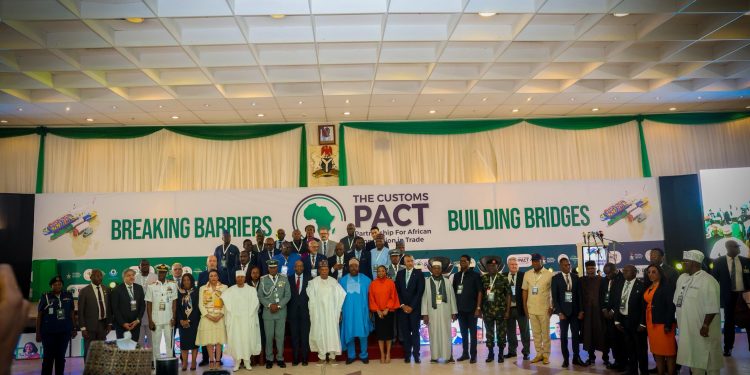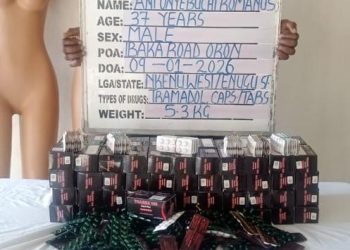By Nkechi Eze
President Bola Ahmed Tinubu on Monday declared that Africa must urgently dismantle inefficient borders, modernise its Customs systems and build a unified trade architecture capable of driving the continent’s long-awaited economic transformation. Declaring open the maiden Customs Partnership for African Cooperation in Trade (C-PACT) Summit at the State House, Abuja, the President represented by Vice President Kashim Shettima said the continent cannot unlock its prosperity without deliberate reforms that convert its vast population and market strength into a functional, globally competitive economic bloc.
Addressing Customs chiefs, ministers, regulators, private-sector leaders and development partners from across the continent, Shettima said Africa must replace its long history of fragmented markets with coordinated policy implementation backed by political will, institutional alignment and digital systems that simplify trade. He explained that the Tinubu administration’s reforms exchange rate unification, fuel subsidy removal, port modernisation and sustained Customs digitalisation were conceived to build a trade-friendly environment powerful enough to elevate Nigeria’s continental ambitions.
The Vice President announced that Nigeria’s National Single Window platform, scheduled for launch in March 2026, will cut cargo clearance timelines from 21 days to less than seven, fully aligning the country with the African Continental Free Trade Area (AfCFTA)’s digital trade framework. “Integration cannot be declared. It must be engineered,” he told the gathering, urging African governments to convert commitments into measurable outcomes visible to traders, manufacturers and logistics operators across the continent.
In his remarks, the Comptroller-General of Customs, Adewale Adeniyi, said President Tinubu’s recent extension of his mandate came with performance indicators tied directly to AfCFTA implementation. He disclosed that the Nigeria Customs Service (NCS) has, over the last three months, expanded engagements with Customs administrations across Africa to ensure that Customs authorities are fully embedded within AfCFTA’s operational structures.
Recalling recent engagements in Ghana with the AfCFTA Secretariat, Adeniyi stressed that Customs must drive rules of origin enforcement, preferential duty implementation and trade preference administration—core determinants of whether AfCFTA becomes a practical economic instrument or remains a continental aspiration. He explained that free trade agreements require robust capacity building and strong political commitment, noting that the progressive suspension of Customs duties demands discipline and consistency from member states.
According to the CGC, past regional integration attempts, including the ECOWAS Trade Liberalisation Scheme, faced serious setbacks because member nations failed to sustain their commitments. He emphasised that AfCFTA must avoid repeating that pattern. Although African economies operate at different levels of readiness, he said recent engagements have strengthened consensus that Customs must occupy a central role in AfCFTA execution.
Adeniyi revealed that his continuous advocacy for Customs inclusion in continental trade governance led to the birth of C-PACT, a framework aimed at building direct partnerships among African Customs administrations, private-sector operators, regulators and international development partners. He noted that Nigeria’s export volume has grown by more than 30 per cent in two years, adding that the next strategic objective is to redirect more of that trade into African markets where the growth potential is deeper and more impactful for the continent.
He commended AfreximBank, the AfCFTA Secretariat, commercial banks, the Nigerian Ports Authority, the Nigerian Export Promotion Council and other agencies for aligning with the Customs Service to accelerate trade facilitation. The CGC also announced that 30 African Customs administrations have registered for the summit, with 22 represented at Director-General level, and strong participation from West, Central, East, Southern and North Africa. He added that, for the first time in Nigeria’s history, the Secretary-General of the World Customs Organisation (WCO) is participating in a Customs conference hosted by the country, a testament to growing global confidence in Nigeria’s leadership.
Adeniyi said the summit would begin with private-sector sessions aimed at understanding persistent challenges, including non-tariff barriers, cargo delays and inconsistent implementation of trade preferences across Africa.
Representing the Minister of Finance, Dr Wale Edun, the Minister of State for Finance, Doris Anite, said Customs reforms remain central to Nigeria’s fiscal transformation. Efficient border operations, she noted, reduce the cost of doing business, strengthen investor confidence, and help Nigeria compete across regional and global markets. She reaffirmed the government’s commitment to the full digitisation of Customs operations, improved risk-management systems and harmonisation with international standards.
On her part, the Minister of Trade, Investment and Industry, Jumoke Oduwole, described AfCFTA as Africa’s most consequential economic instrument but warned that structural delays and outdated systems still impede its impact. She highlighted reforms undertaken with the NCS, including tariff concession schedules and a dedicated air-cargo export corridor linking Nigeria to East and Southern Africa.
WCO Secretary-General Ian Saunders, referencing one of the organisation’s mottos “Borders divide; Customs connects” said Africa’s positive economic forecast for 2025 can only be realised through Customs efficiency. He stated that C-PACT aligns with WCO’s mandate to support Customs administrations through standards setting, operational guidance and targeted capacity building.
Also speaking, AfreximBank’s Executive Vice President for Intra-African Trade, Kanayo Awani, said the bank is supporting Customs modernisation across Africa through transit-bond guarantees, digital cargo-tracking solutions and the AfCFTA Adjustment Fund designed to cushion tariff revenue losses among member states. She emphasised that Africa cannot fully unlock AfCFTA benefits without harmonised systems and interoperable Customs procedures.
AfCFTA Secretary-General Wamkele Mene added that successful implementation of AfCFTA annexes on Customs cooperation, transit and trade facilitation requires Customs leadership at every phase. He praised Nigeria’s leadership and the CGC’s role as Chair of the WCO Council, noting that the continent depends on Customs to translate trade rules into practical border outcomes that lower costs, reduce bureaucracy and protect market access for African products.
















